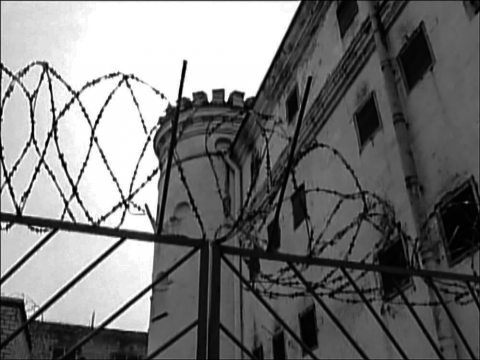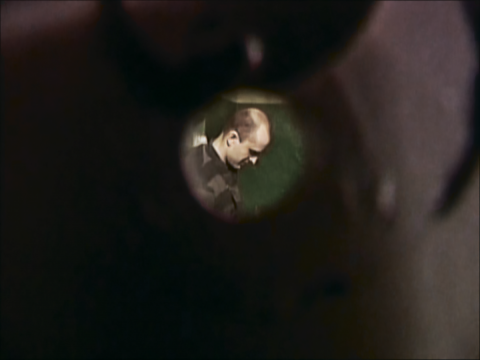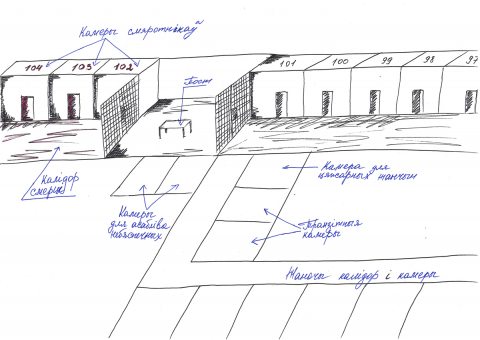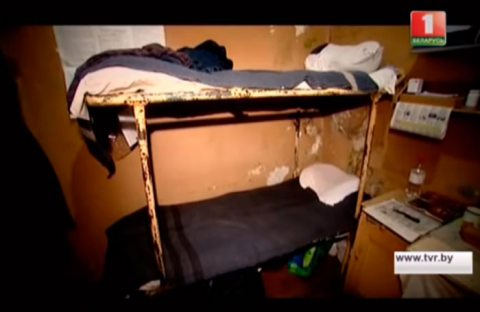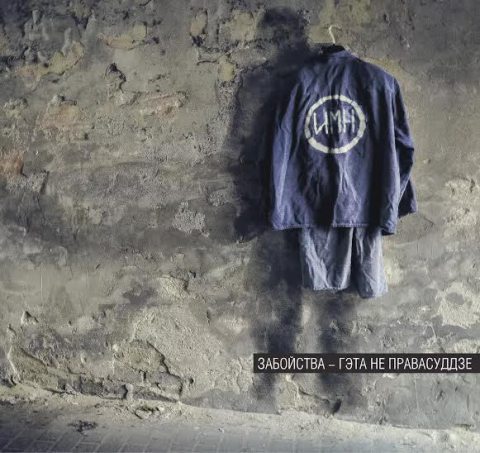Death row secrets. Part 3
The topic of the death penalty is still a dark secret in Belarus. The public knows very little about the conditions of those held on death row. We only know that after the verdict they are for a while imprisoned in a jail in the center of Minsk. Therefore, human rights defenders are always trying to glean the necessary information. Representatives of the campaign “Human Rights Defenders against the Death Penalty in Belarus” have gathered memories and testimonies of former prison staff and former inmates, their family members, part of which has been used to prepare this publication. For obvious reasons, these people asked not to disclose their names.
Skydiving without a parachute
Almost all the death convicts write to the President to ask for pardon, although having little hope that he will keep them alive. Today it is known that Aliaksandr Lukashenka has pardoned only one person sentenced to death.
What happens to the prisoner and his mind in a state of constant pressure in anticipation of execution?
According to the testimony of prison staff, many death convicts attempt to commit suicide. It was once said in an interview with the prison’s former head Aleh Alkayeu. He recalled a time when two persons sentenced to death were held in the same cell.
“Death is always terrible. Even a natural one. But when life is taken by other people, death becomes infinitely terrible. And never believe those who complain about a life sentence, saying that it would be better if he was shot. The right to voluntarily leave this life can never be taken from a human being. Even in prison, there are dozens of ways to commit suicide. But suicide is a rare case in prison. I remember only one case when two convicts hanged themselves in turn on one rope just a few days before the execution. Having calculated the frequency of sentry’s walks, which was about 8-10 minutes, one of them hanged himself. The other one had time to take him down, put the body on the bed and lay down himself. Then, after the guards had passed the cell, he climbed a chair and put his head into the loop, where he was later found.
People on death row are in a constant state of nervous tension. As noted by Aleh Alkayeu, it’s like skydiving without a parachute, where there is a slim chance of falling on a haystack. Naturally, during the execution the tension reaches the upper limits the human body can endure:
“It’s difficult to determine the level of madness, but inadequacy and prostration can be observed in almost each of them. The convicts tend to be humble and completely weak-willed. It is difficult to single out some individual traits. I remember only a few people who look more or less aware of what was going on before the execution.”
During his stay in jail, death convict Ryhor Yazepchuk lost his mind. According to the prison staff former prisoners, he was ‘lying on the floor, rolling from one corner of the cell to another and singing songs, but they did not try to calm him down.”
Vasil Yuzepchuk, Ryhor Yazepchuk’s distant relative, who was also sentenced to death, was illiterate. He was taught to write and read by another death convict Andrei Zhuk. The latter sent several letters to human rights defenders. Thanks to him, it became known that Yuzepchuk was with him in the same cell.
“Andrei Zhuk’s letters said that his cellmate Vasil Yuzepchuk, who was almost illiterate, tried to overcome the horror of death singing from time to time a line from the song “I'll sit in a convertible and go away somewhere...”. Although you cannot go anywhere, you can just ‘depart under the sentence’.”
Eduard Lykau was characterized as a very impulsive person who used a lot of gesturing when talking to other people.
“Lykau was always saying something, waving his arms. Unlike him, his cellmate Sialiun was very quiet. He was the quietest and most peaceful prisoner ever. But from time to time, they had to take turns, then Sialiun got up and walked across the room, while Lykau was sitting. For convicts, smoking and walking are the only entertainment. They could also sit down and write a letter at a small table.”
Another death convict, Aliaksandr Hrunou, tried to cut himself, after his cellmates had been executed:
“There was an accident in Valadarka. All prisoners are allowed to shave, for that they are given disposable razors. A guard gave him a razor and did not watch him shave. And then he noticed that Hrunou began to dismantle the razor. And he could not react quickly, as he had to open the cell and prevent it. It took time to notify the prison head, and he had managed to take out the blade and was going to cut his hands and neck, but when the staff broke into the cell he threw the blade into the sink. Later they invited a plumber to take out the blade.”
Sometimes, testimonies by the prison staff are inconsistent, and it is rather difficult to establish the exact chronology, but here’s what witnesses told about the convicts held in the new cells.
“Sialiun and Lykau were shot at the same time. There was a time when Ryhor Yazepchuk was taken out, probably to be shot. Then the others were put in one-man cells. Yazepchuk was then in cell No. 102. Then Hrunou and Sialiun were put in cell No. 104. After Hrunou’s neighbors, Lykau and Sialiun, were gone, he tried to commit suicide.”
These three isolated cells on death row, which are now located in the new building, have several other cells adjacent to them. Next to the death convicts, there are several cells for those serving life sentences, as well as some dangerous criminals.
Human rights activist Andrei Bandarenka is one of the recent inmates of this building. Before he was transferred here, the cell window had been protected by a fine-meshed net, and a lock was installed in the small window in the door. All this was done in order to prevent Bandarenka’s contacts with other prisoners, as well as to increase psychological pressure on him.
Nearby is the cell that used to hold one of the key Belarusian criminal bosses Dzmitry Haleyeu.
“I want them to shoot me”
Human rights defenders received a letter from death convict Pavel Sialiun, which was written during his detention in the Valadarka jail. This, as he was described, outwardly calm and quietest of all prisoners, wrote in two languages when awaiting execution. Below is a poem in Russian [with a word-for-word English translation], but he also sent several letters in Belarusian.
|
Я хочу, чтоб меня расстреляли, Чтобы пулю в затылок пустили. Никогда вы, ублюдки, не знали, Грязной лапой кого погубили. Не осталось во мне человека. Из-за вас превратился я в зверя, В душегуба, убийцу и зека! Это ваше взошло во мне семя. Я своих палачей презираю, Мне плевать на судью, прокурора. Свысока я за тем всем взираю, Что запишут в листы приговора. Не меня посадили вы в клетку, А свою обнищавшую совесть! И на ней вы поставите метку, Когда выстрелом кончите повесть! |
I want them to shoot me, To let a bullet in my head. You bastards have never known Who you’ve killed with your dirty paw. There’s nothing of a human being in me anymore. Because of you, I’ve turned into a beast, A murderer, a killer and a prisoner! It's your seed that has sprouted in me. I despise my executioners, I spit on the judge and the prosecutor. I look down on everything To be written in the verdict sheets. It’s not me you have put in a cage, But your impoverished conscience! And you are going to label it, When a shot will finish the story! |
At first glance, it seems that this is a poem by a man obsessed with hatred, as it is full of resentment and anger! But it is necessary to stop and think about this: why did he write this? Did he live outside society? Didn’t he live next to us? Pavel Sialiun, who was executed in the name of the state, is also part of our society, part of ourselves. Apparently, society should remember that.
This was also noted in a recent interview by the coordinator of the campaign “Human Rights Defenders against the Death Penalty in Belarus” Andrei Paluda:
“You have to understand that people who have been sentenced to death are not aliens from another planet, but the citizens of our country who live next to us. And we always have to analyze why a man chose to commit a brutal crime. If you look at the portrait of a death convict, most often this is a person who has previously been convicted. This raises the question in our prison system. What do the people face in prisons, if they are released with even more violent behavior? In addition, the problem of alcoholism is very acute. Most murders are committed in Belarus while intoxicated. Sending Kulesh to death, the government fights crime in the society, on the one hand. But on the other hand, it pours alcohol, by allowing the sale of alcohol at night before the elections.”
One of the death convicts, Aliaksandr Hrunou, who briefly shared a cell with Pavel Sialiun, after shooting Selyun and Lykov was for a time transferred to cell No. 73 located on the second floor of so-called mental hospital [a building for persons convicted of minor crimes]. This happened after Hrunou’s sentence was overturned by the Supreme Court and case was sent back for revision. This was an unprecedented thing – a man walking out of death row. However, the death sentence was later confirmed. His cellmates say that he was always quiet, did not talk much, paid no interest to anything and always kept his things packed in a bag, as if he were always ready to go somewhere.
Valadarka still remembers the sensational case of the terrorist act in the Minsk subway, followed by the execution of two men, Dzmitry Kanavalau and Uladzislav Kavaliou. It was initially reported that they were constantly held in the KGB jail, but as it became known later they were brought to Valadarka for a while, apparently to be executed here.
“Kanavalau and Kavaliou were in Valadarka for one day. They were brought here just for an hour. Some of the jail staff still believe that the executed men were innocent.”
The topic of the death penalty remains relevant in the Belarusian society. Information on executions is still classified. Family members do not know the time or the place of convicts’ burial and cannot visit their graves. On the other hand, the relatives of the victims of criminals who often ask for the death penalty for the murderers of their loved ones do not receive adequate psychological assistance from the state, and their desire for revenge does not help to overcome the severity of the loss.
Belarus continues to use its Soviet legacy – the death penalty. Given the country's attempts to improve relations with Europe, executions at the heart of the continent look more than absurd today.
